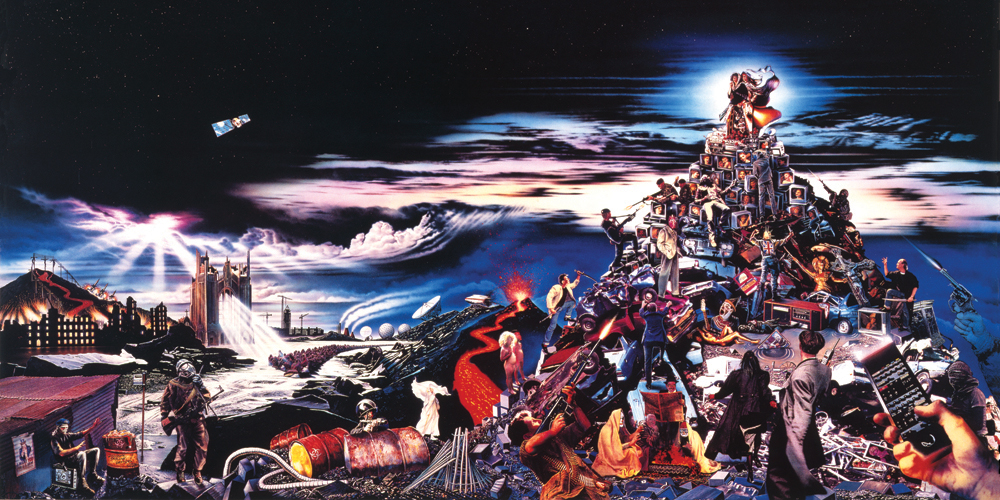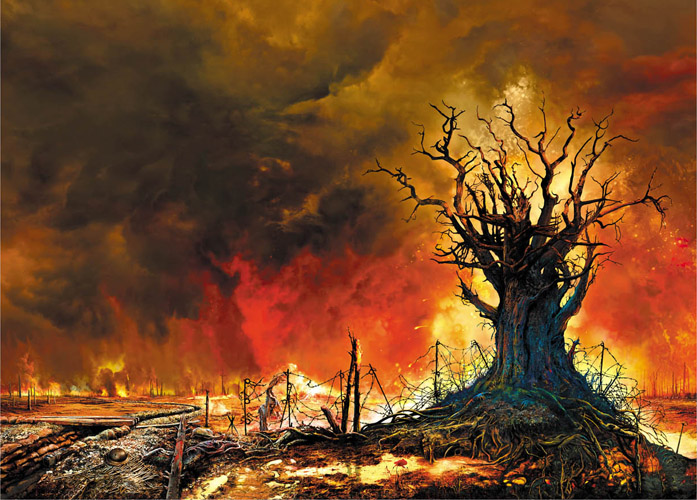Fish

Prelude
I have very early memories of rock music in my life. Since I was a toddler, my parents (and particularly my dad) got me used to listen to 80s rock music. Bands like Queen, Guns N' Roses, AC/DC, Van Halen, and Bon Jovi are ingrained in my memories as sounds of my childhood.
It's not surprising that my taste in music has developed from there, branching out over the years in metal and progressive rock. Music is a constant companion of my daily life and contributed to the formation of my identity.
My taste changed and adapted: around ten years ago I was dismissing Operation: Mindcrime by Queensrÿche as a mediocre album, but two years ago I picked it up again and it was a revelation. Something similar happened while listening to Rage Against the Machine, Tool or A Perfect Circle, didn't like them years ago, absolutely love them now.
This change got me thinking - why do these bands resonate with me now?
I think the answer lies primarily in the integrity of the message connected to these bands: their perspective, political stance, perspective on life really struck a cord with me in my 30s. They take an explicit position around issues I care about.
Enter Marillion and Fish

Until a year ago, I had a very cursory knowledge of Marillion's body of work. I kney they existed, that they have a substantial discography and that they represent an important page in the history of 80s and 90s prog.
One morning, Spotify's suggestions algorithm decided to play Incommunicado and Sugar Mice in the space of an hour. I found myself stopping what I was doing in both instances - there was something about those songs that really dragged my attention. I loved the music - but the lyrics stopped me in my tracks.
Incommunicado is about ambition, the drive to make it big without taking responsibilities. In the context of the entire album, it's both a metaphor for the difficult life of Torch, the main character whose life is falling to pieces, but also a direct description of the music business.
Sugar Mice is a song about the devastating effects of unemployment and economic recession. The title refers to a popular english sweet made of sugar. The main refrain "We're just sugar mice in the rain" gives a very vivid representation of how fragile life can be.
The words, references, and metaphors included in the lyrics stood out as something completely out of the ordinary - it sounded like poetry.
The more I explored other Marillion's songs, the more I realized that what really resonated with me was Fish, their initial singer and lyricist. Following his body of work after he left Marillion, I kept finding incredible songs.
Love and relationships
Do you remember?
Barefoot on the lawn with shooting stars
Do you remember?
The loving on the floor in Belsize Park
Do you remember?
Dancing in stilettoes in the snow
Do you remember?
You never understood I had to go
By the way, didn't I break your heart?
Please excuse me, I never meant to break your heart
So sorry, I never meant to break your heart
But you broke mine — Kayleigh, 1985
By far the most succesful Marillion song, Kayleigh is often cited as Fish's apology to different women for the failure of their romantic relationships, a collage of vivid images and melancholic moments.
To me, this song sows the seeds of a theme that goes through a few songs written by Fish: work/life balance. Relationships fail when you divert your attention away from them, when you don't put in everyday work to keep them going.
In Zoë 25 it's the aftermath of another relationship that didn't go well:
When you're looking for somebody, you might not even see them,
When they're standing there in front of you, right before your eyes,
If you're looking for somebody you're gonna need some help,
You know you'll never find her when you're looking for yourself. — Zoë 25, 2007
In Garden of Remembrance, it's Alzheimer's disease, something completely outside our control:
He's lost between the here and now
Somewhere that he can't be found
She's still here
Her love a ghost of memory
She'll wait for an eternity
He's still here — Garden of Remembrance, 2020
In cliche, the song lyrics use estabilished cliches to acknowledge that no matter how much hard you try, sometimes the simplest thing you can say is what matters.
That's why I'm trying to say with my deepest sincerity
That's why I'm finding it comes down to the basic simplicities
The best way is with an old cliche
It's simply the best way is with an old cliche
Always the best way is with an old cliche
I'll leave it to the best way, it's an old cliche
I love you. — Cliche, 1990
In Punch and Judy1 it's the progressive deterioration of a relationship, escalating in murdering fantasies:
Whatever happened to morning smiles,
Whatever happened to wicked wiles, permissive styles,
Whatever happened to twinkling eyes,
Whatever happened to hard fast drives,
Complements on unnatural sizePunch, Punch, Punch And Judy, Punch, Punch, Punch And Judy
Punch, Punch, Punch And Judy.Propping up a bar, family car,
Sweating out a mortgage as a balding clerk,
Punch And Judy, [Judy]
World war three, suburbanshee,
Just slip her these pills and I'll be free.No more Judy, Judy. Judy no more! Goodbye Judy! — Punch and Judy, 1984
Living on your own terms
Another recurring topic is the idea of living on your own terms. From Tongues, where Fish lets out the frustration of dealing with lawyers during a very long lawsuit with music publisher EMI:
Your entrenched opinions,
On the border of arrogance,
Dug in against the compromise.
A position indefensible, your actions illogical
You're speaking in tonguesYou swear contradictions
Your tedious monologues, wielding authority,
Demanding subservience, demanding
I make your sense.
Demanding speaking in tongues. — Tongues, 1991
The inability to speak the same language becomes a massive blocker. The aforementioned lawsuit with EMI ended up being a fundamental event in Fish's life, pushing him to pursue the ownership of all rights of his solo albums (except the first one, Vigil in a Wilderness of Mirrors).
In Circle Line2, it's the awareness of the 9-to-5 grind that is imposed on the majority of us:
9 to 5's the only time I try to kid myself that I'm still alive,
That I'm living out the dream to earn my freedom from this rat race
Where all I do's survive, I live the lie, I serve my time.The circle line.
Just another day, just another day, just another day,
Just another day, just another day, just another day on the circle line.The circle line, on the circle line. — Circle Line, 2007
Lost Plot, on losing track of what matters:
I was blinded by light but the vision had died, I'd forgotten
In time just what I was fighting for
I'd forgotten who's side I was on, the difference between
Right and wrong
I was out of my depth, going out of my mind, going down in
A field where no prisoners are taken, no quarter is given
The writing was small, it burned on the wall, I'd sold out
My soul for what it was worth
I'd lost the plot, my number was up, the game was over
Snakes and ladders, a world of snakes and ladders, snakes
And ladders — Lost Plot, 2004
View from the Hill, where we the hill is an endless collection of things that don't matter and just keep us imprisoned.

You sit and think that everything is coming up roses
But you can't see the weeds that entangle your feet
You can't see the wood for the trees 'cause the forest is burning
And you say it's the smoke in your eyes that's making you cryThey sold you the view from a hill
They told you that the view from the hill would be
Further than you have ever seen before
They sold you a view from a hill
They sold you a view from a hill — View from the Hill, 1990
The system has failed (us)
Fish has never shied away from commenting on politics: from Market Square Heroes (Marillion's first single) to Weltschmerz, the ending track of his latest (and last) album.
Market Square Heroes3 is once again an anthem of an angry generation that suffers the consequences of austerity and recession:
I give peace signs when I wage war in the disco
I'm the warrior in the ultra violet haze
Armed with antisocial insecurity
I plan the path of destiny from this mazeCause I'm a Market Square hero gathering the storms to troop
Cause I'm a Market Square hero speeding the beat of the street pulse
Are you following me, are you following me?
Well suffer my fallen angels and follow me
I'm the Market Square hero, I'm the Market Square hero
We are Market Square Heroes, to be Market Square Heroes — Market Square Heroes, 1982
Weltschmerz is a summary of all fights worth fighting - from climate change, to poverty, to the general failure of a political system that emphasized polarisation and division:
I am a grey bearded warrior, a poet of no mean acclaim
My words are my weapons that I proffer with disdain
My melancholy aspect is something you can’t disregard
My motives you cannot question nor my strong sense of right and wrong\\I’ve formed the opinion that things can’t stay as they are
My anger and my fury trapped like a wasp in a jar
It’s never too late to make a brave new start
When the revolution is called I will play my part — Weltschmerz, 2020
Perfume River
Perfume River4 deserves a mention on its own: in this song, Fish looks at the consequences of the Vietnam War, whose images are burned in his childhood memory.

Fire breathing dragons swarm in sweltering skies, spewing flame on innocents below
Charred and brittle corpses, blackened evidence, I am enraged, I am afraid, I am forlorn
The ashes from wise pages fly from libraries, tumble in the clouds of smoke and flies
To lie as dust in corners of dark palaces, the fetid smell of revolution haunts the air.Take me away to the Perfume River; carry me down to the perfume river
Set me adrift on a well-stocked open boat
Show me the way to the Perfume River, send me away down the perfume river
Pour that sweet, sweet liquor down my throat; pour it down my throat — Perfume River, 2013
Once again, the images evoked are incredibly strong, full of colour - red flames and rage, smoke, dust and death.
Visuals
A powerful ingredient in Fish's artistic work has always been his collaboration with Mark Wilkinson, who illustrated all Marillion's albums (until Fish left the band) and all of Fish's work. His surrealistic style is unmistakable and perfectly complements the "visual" nature of a lot of Fish's songs.
The title refers to Punch and Judy, the main characters of a puppet show popular in British culture. See the Wikipedia page for more information.
The Circle Line is one of London's Underground lines.
The title is both a reference to a market square in Ailesbury, an english town, and Nietzsche's Parable of the Madman.
The title refers to a river running through the city of Huế in Vietnam, one of the cities deeply affected by the Vietnam War.